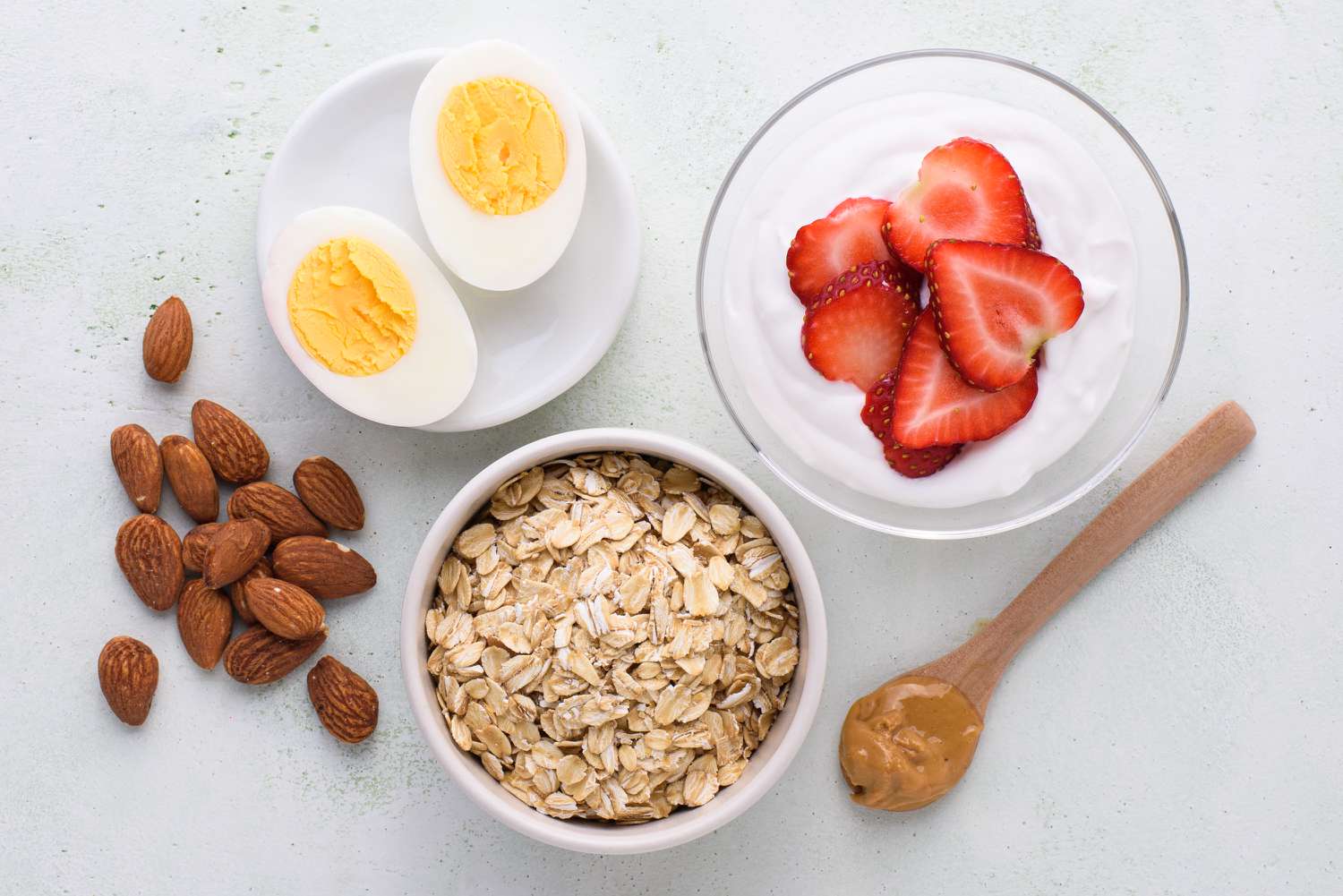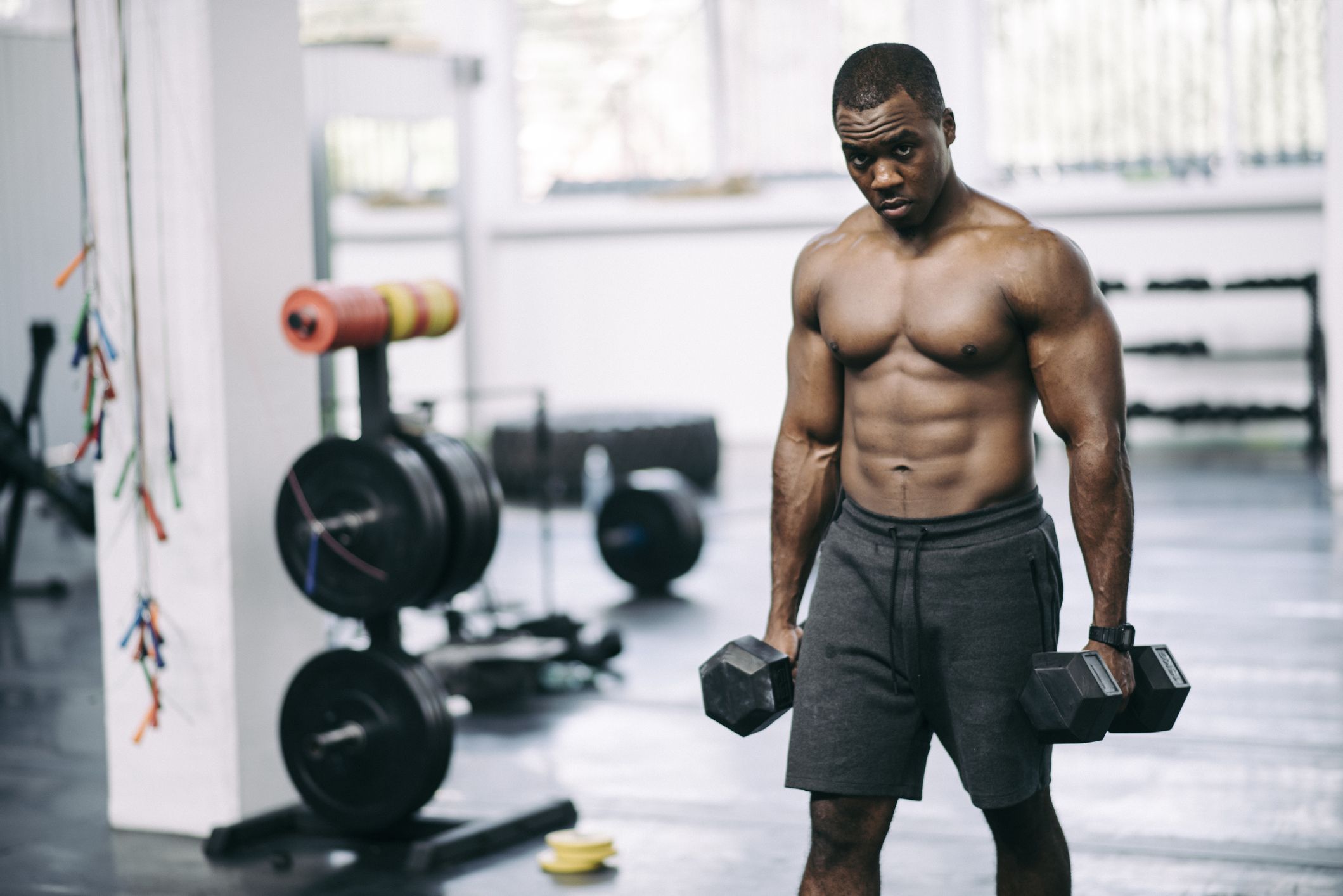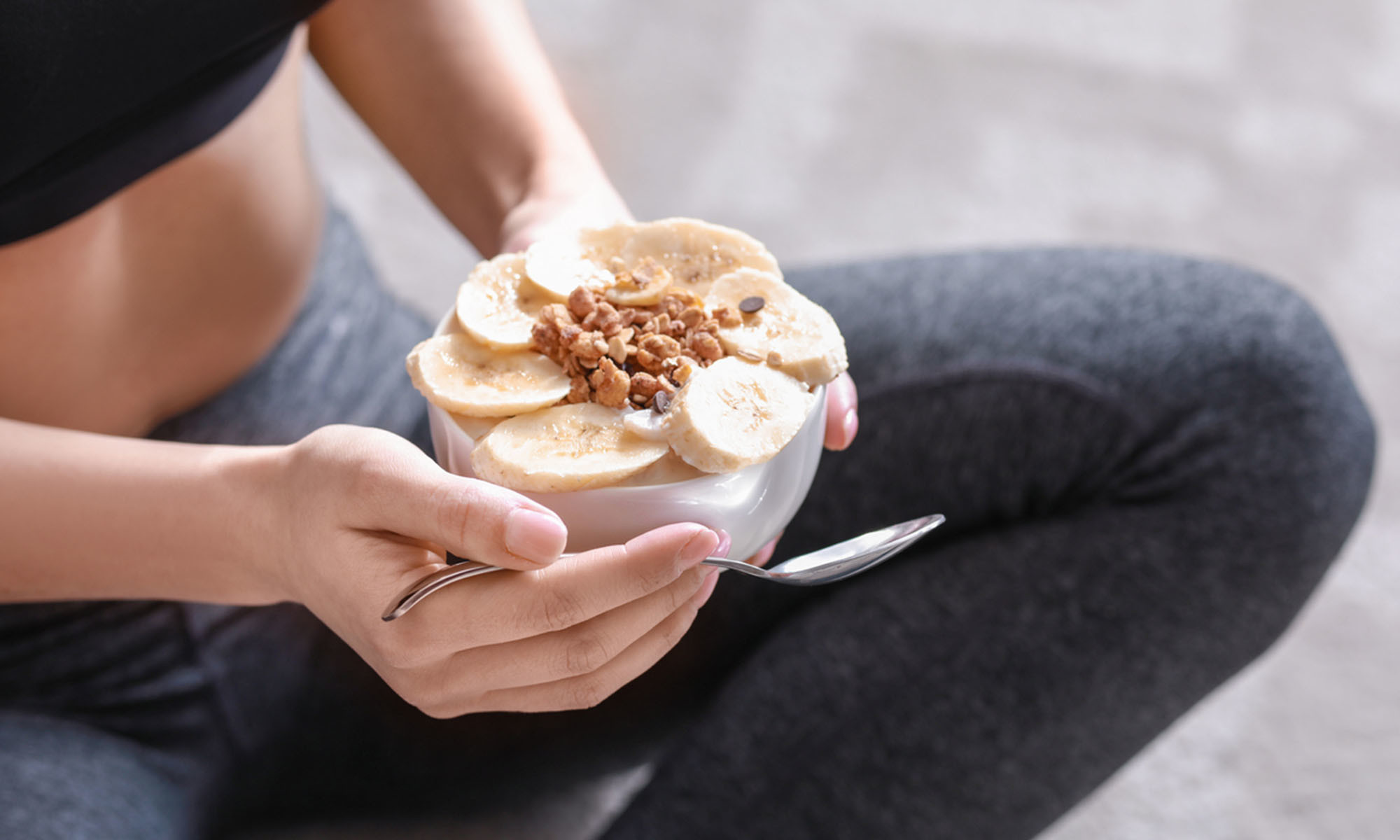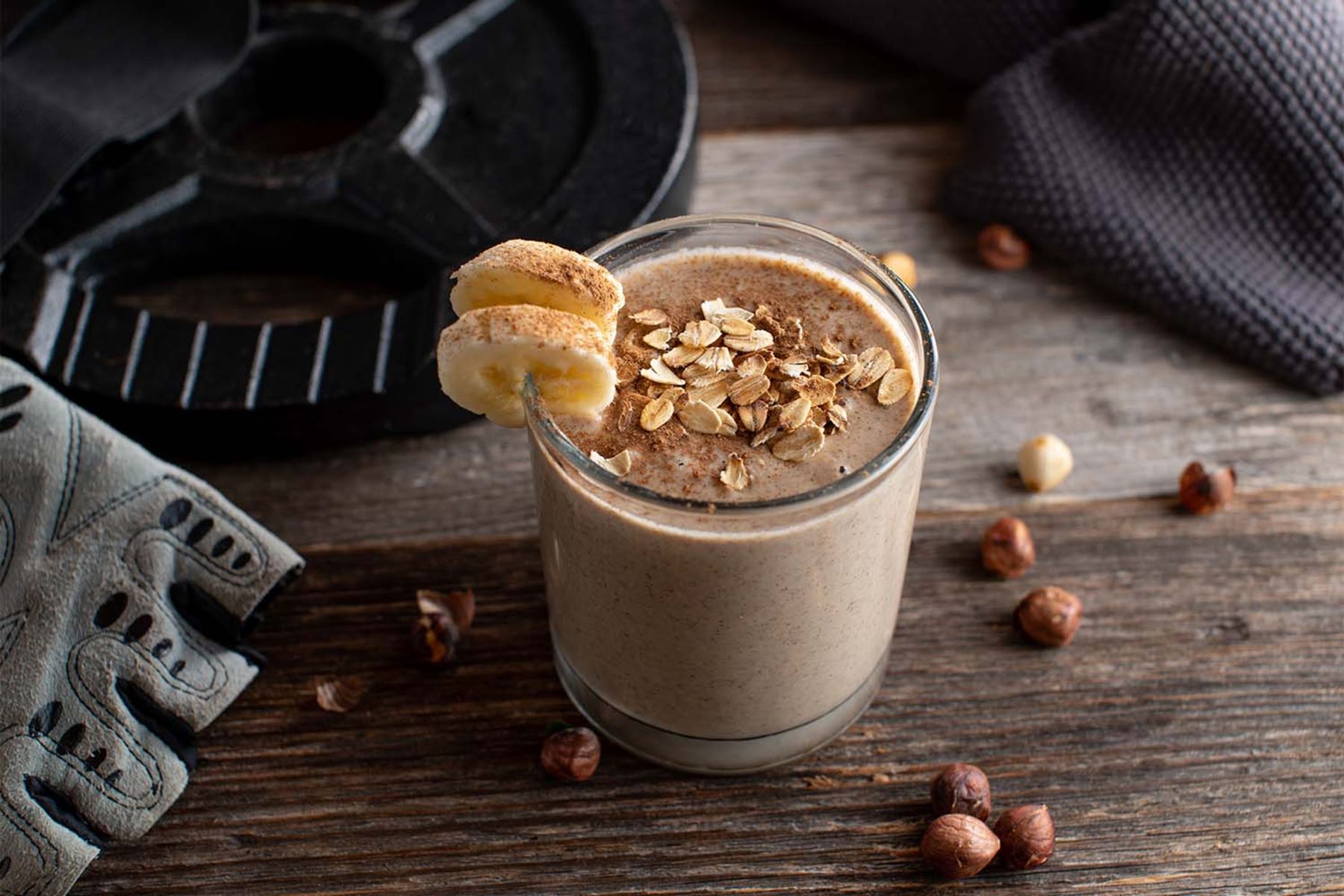

Featured
What To Eat For Athletic Performance
Modified: January 2, 2024
Discover the top foods to fuel your athletic performance! This featured guide reveals the best nutrition strategies for maximizing your strength and endurance.
Introduction
When it comes to athletic performance, there are numerous factors that contribute to success, including skill, training, and dedication. However, one often overlooked aspect is nutrition. Proper nutrition plays a crucial role in optimizing athletic performance, providing athletes with the fuel they need to perform at their best.
Whether you’re a professional athlete or a weekend warrior, understanding the importance of nutrition and making informed choices about what you eat can make a significant difference in your performance and recovery. By fueling your body with the right nutrients, you can improve your endurance, strength, and overall athletic abilities.
In this article, we will explore the impact of nutrition on athletic performance and delve into the specific macronutrients and micronutrients that are essential for optimizing performance. We will also discuss the importance of hydration and electrolyte balance and provide guidance on pre-workout, during workout, and post-workout nutrition strategies. Additionally, we will touch upon the role of supplements in enhancing athletic performance.
By the end of this article, you will have a comprehensive understanding of how nutrition impacts athletic performance and how you can optimize your diet to support your fitness goals.
Importance of Nutrition for Athletic Performance
Nutrition plays a pivotal role in athletic performance. It is the foundation upon which an athlete’s training and skills are built. Proper nutrition provides the necessary fuel for muscles, aids in recovery, and enhances overall performance. Without a well-balanced diet, athletes may experience decreased energy levels, increased fatigue, and diminished endurance.
One of the primary reasons nutrition is crucial for athletic performance is its impact on energy levels. Carbohydrates, proteins, and fats are the macronutrients that supply the body with energy. Carbohydrates, in particular, are the body’s preferred source of energy, providing readily available fuel for muscles during exercise. Eating an adequate amount of carbohydrates helps to sustain energy levels and delay fatigue during physical activity.
Protein is also essential for athletes, as it aids in muscle repair and growth. During exercise, muscles undergo stress and breakdown, and consuming enough protein helps to repair and rebuild these tissues. Additionally, protein plays a crucial role in optimizing the immune system and supporting overall recovery.
While carbohydrates and protein are important, fats should not be neglected. Healthy fats provide a concentrated source of energy and are necessary for proper hormonal function. They also assist in the absorption of fat-soluble vitamins, which are essential for overall health.
Furthermore, micronutrients like vitamins and minerals are essential for athletic performance. Vitamins such as vitamin C, vitamin E, and B-complex vitamins are antioxidants that protect the body against oxidative stress caused by intense physical activity. Minerals like iron, calcium, and potassium are also crucial for maintaining optimal muscle function, bone health, and electrolyte balance.
Hydration is another crucial aspect of nutrition for athletes. Proper hydration is essential for maintaining blood volume, regulating body temperature, and preventing muscle cramps. Dehydration can lead to decreased performance, impaired cognitive function, and increased risk of heat-related injuries. It is recommended that athletes consume an adequate amount of water before, during, and after exercise to ensure optimal hydration levels.
Overall, a well-planned and comprehensive nutrition strategy is vital for athletes looking to maximize their performance. By fueling the body with the right nutrients, athletes can improve their energy levels, enhance muscle recovery, and optimize their overall athletic abilities. It is important for athletes to work with a registered dietitian or sports nutritionist to create an individualized nutrition plan that meets their specific needs and goals.
Macronutrients for Energy
When it comes to fueling athletic performance, macronutrients play a crucial role. The three main macronutrients – carbohydrates, proteins, and fats – provide the energy necessary for physical activity and optimal performance.
Carbohydrates: Carbohydrates are the body’s primary and preferred source of energy. They are broken down into glucose, which is used by the muscles as fuel during exercise. Including an adequate amount of carbohydrates in an athlete’s diet is essential for sustained energy levels and optimal athletic performance. Good sources of carbohydrates include whole grains, fruits, vegetables, and legumes.
Proteins: Protein is crucial for muscle repair, growth, and recovery. During exercise, muscles undergo stress and breakdown, and adequate protein intake is necessary to promote muscle repair and rebuilding. Good sources of protein for athletes include lean meats, poultry, fish, dairy products, eggs, and plant-based sources such as legumes, tofu, and quinoa.
Fats: While carbohydrates and proteins are the primary sources of energy during exercise, fats also play a vital role. Healthy fats are a concentrated source of energy, providing fuel for prolonged endurance activities. Additionally, fats are necessary for hormone production and absorption of fat-soluble vitamins. Good sources of healthy fats include avocados, nuts, seeds, olive oil, and fatty fish.
It is important for athletes to find the right balance of macronutrients to support their individual needs and goals. The appropriate ratio of carbohydrates, proteins, and fats may vary depending on the type and intensity of physical activity, as well as the athlete’s body composition and personal preferences.
Timing is also important when it comes to macronutrient intake. Pre-workout nutrition should focus on consuming carbohydrates for readily available energy. This can help optimize performance by ensuring that glycogen stores are adequately replenished. Post-workout, it is crucial to consume a combination of carbohydrates and protein to support muscle recovery and glycogen replenishment.
Athletes should work with a registered dietitian or sports nutritionist to develop an individualized nutrition plan that addresses their macronutrient needs. This will help to optimize energy levels, enhance performance, and support muscle repair and growth for improved athletic performance.
Carbohydrates
Carbohydrates are the body’s primary source of energy during exercise. They are broken down into glucose, which is used by the muscles as fuel. Consuming an adequate amount of carbohydrates is crucial for athletes to maintain optimal energy levels and enhance performance.
There are two types of carbohydrates: simple carbohydrates and complex carbohydrates. Simple carbohydrates are made up of one or two sugar molecules and are quickly digested and absorbed by the body. They provide a rapid burst of energy, making them beneficial for athletes during high-intensity activities. Examples of simple carbohydrates include fruits, fruit juices, honey, and sports drinks.
On the other hand, complex carbohydrates consist of long chains of sugar molecules and take longer to be broken down and absorbed by the body. These carbohydrates provide sustained energy and are particularly beneficial for endurance activities. Examples of complex carbohydrates include whole grains, legumes, starchy vegetables like potatoes, and whole wheat pasta.
For optimal performance, it is important to choose carbohydrates that are high in fiber and have a low glycemic index (GI). High-fiber carbohydrates, such as whole grains, fruits, vegetables, and legumes, not only provide sustained energy but also contribute to long-term health and digestion. Low GI carbohydrates are digested more slowly, leading to a gradual and steady release of glucose into the bloodstream, which helps maintain blood sugar levels and sustain energy throughout prolonged exercise.
Athletes should consider their carbohydrate needs based on the duration and intensity of their training. For shorter, high-intensity activities, focusing on simple carbohydrates can provide quick energy. For longer endurance activities, incorporating a mix of both simple and complex carbohydrates can help sustain energy levels and prevent fatigue.
Timing is also important when it comes to carbohydrate intake. Consuming carbohydrates before exercise can help top up glycogen stores and provide an immediate source of energy. During extended workouts or events lasting longer than an hour, consuming carbohydrates in the form of energy gels, sports drinks, or easily digestible snacks can help maintain energy levels. After exercise, consuming carbohydrates within the first 30 minutes to an hour is crucial for glycogen replenishment and muscle recovery.
Athletes should work with a registered dietitian or sports nutritionist to determine their individual carbohydrate needs. Together, they can create a structured nutrition plan that incorporates the right types and amounts of carbohydrates to optimize energy levels and improve athletic performance.
Protein
Protein is an essential macronutrient for athletes, playing a crucial role in muscle repair, growth, and recovery. When engaging in physical activity, muscles undergo stress and breakdown. Consuming an adequate amount of protein is essential to support the repair and rebuilding of muscles, leading to improved athletic performance.
Protein is made up of amino acids, which are the building blocks of muscle tissue. There are two types of protein sources: complete and incomplete. Complete proteins contain all nine essential amino acids that the body cannot produce on its own. Animal-based protein sources such as meat, poultry, fish, dairy products, and eggs are considered complete proteins. Incomplete proteins, found in plant-based sources like legumes, tofu, quinoa, and rice, do not contain all nine essential amino acids. However, by combining different plant-based protein sources, athletes can still obtain all the necessary amino acids.
The optimal protein intake for athletes varies depending on factors such as body weight, training volume, and type of sport. A general guideline for athletes is to consume between 1.2 to 2.0 grams of protein per kilogram of body weight per day. However, individual needs may differ, and it is recommended that athletes work with a registered dietitian or sports nutritionist to determine their specific protein requirements.
Timing is crucial when it comes to protein consumption. Consuming a source of protein within the first one to two hours after exercise helps to maximize muscle repair and recovery. This can be achieved through a combination of whole foods and protein-rich snacks or supplements such as protein shakes. Including a source of protein in each meal and snack throughout the day can also help ensure adequate protein intake and promote muscle maintenance and growth.
It’s important to note that while protein is important, it should not be the sole focus of an athlete’s diet. A well-rounded and balanced meal plan that includes a variety of nutrient-dense foods is essential for overall health and optimal performance.
Athletes who follow a vegetarian or vegan diet may have additional considerations when it comes to meeting their protein needs. Plant-based protein sources can provide ample protein, but it may require careful planning and variety to ensure all essential amino acids are obtained. Consulting with a registered dietitian or sports nutritionist who specializes in vegetarian or vegan diets can be beneficial in developing a well-balanced nutrition plan.
Incorporating adequate protein into an athlete’s diet is crucial for muscle repair, growth, and recovery. By consuming a variety of complete and incomplete protein sources and timing protein intake strategically, athletes can support their athletic goals and optimize overall performance.
Fats
Fats are often misunderstood and overlooked in the context of athletic performance, but they play a crucial role in fueling and supporting an athlete’s body. While carbohydrates are the primary source of energy during exercise, fats provide a concentrated source of energy and are necessary for overall health and optimal athletic performance.
There are different types of fats, including saturated fats, unsaturated fats, and trans fats. It is important for athletes to focus on consuming healthy fats, particularly unsaturated fats, which are beneficial for heart health and provide essential fatty acids.
Healthy fats can be found in foods such as avocados, nuts, seeds, olive oil, and fatty fish like salmon and mackerel. Including these nutritious fats in an athlete’s diet can provide a sustained source of energy, support hormone production, and aid in the absorption of fat-soluble vitamins.
Contrary to popular belief, consuming healthy fats does not lead to weight gain. In fact, fats can help athletes feel satisfied and fuller for longer periods, reducing the likelihood of overeating or snacking on unhealthy options. Including a moderate amount of healthy fats in meals and snacks can promote satiety and provide a steady source of energy throughout physical activity.
It is important to note that while fats are beneficial, they are also calorie-dense, so portion control is crucial. Athletes should aim to incorporate healthy fats into their diet in moderation and focus on a balanced approach that includes a variety of macronutrients.
Athletes who engage in endurance activities such as long-distance running or cycling may benefit from slightly higher fat intake, as fat can serve as a source of energy during prolonged exercise. Fat adaptation, which involves training the body to utilize fats more efficiently during endurance activities, may be beneficial for some athletes. However, it is essential to work with a registered dietitian or sports nutritionist to develop an individualized approach based on specific goals and training demands.
Overall, fats are an important part of an athlete’s diet, providing energy, supporting overall health, and contributing to optimal athletic performance. Including a variety of healthy fats in moderation can help athletes maintain a well-rounded and balanced nutrition plan, enhancing their overall athletic abilities.
Micronutrients for Performance
While macronutrients like carbohydrates, proteins, and fats are crucial for fueling athletic performance, micronutrients also play a vital role in supporting optimal performance. Micronutrients include vitamins and minerals, which are necessary for various physiological processes, energy production, and overall health.
Vitamins: Vitamins are organic compounds that are necessary for normal cell function, growth, and development. Different vitamins have different roles in the body, and each plays a unique part in supporting athletic performance. For example:
- Vitamin C is an antioxidant that helps protect cells from oxidative stress caused by intense physical activity. It also plays a role in collagen synthesis, which is important for connective tissue health.
- Vitamin E is another antioxidant that helps protect cells from damage and supports immune function.
- B-complex vitamins, including B1, B2, B3, B6, and B12, are essential for energy metabolism and the production of red blood cells, which transport oxygen to muscles.
It’s important for athletes to consume a variety of fruits, vegetables, whole grains, and lean proteins to ensure an adequate intake of vitamins.
Minerals: Minerals are inorganic substances that are necessary for various bodily functions, including muscle contraction, nerve transmission, and fluid balance. Key minerals for athletes include:
- Iron is vital for the production of hemoglobin, which carries oxygen to muscles. Iron deficiency can lead to decreased endurance and fatigue.
- Calcium is important for bone health and plays a role in muscle contractions.
- Potassium and sodium are electrolytes that help maintain fluid balance, nerve function, and muscle contractions.
Athletes can incorporate mineral-rich foods such as leafy green vegetables, dairy products, lean meats, nuts, seeds, and whole grains into their diet to ensure adequate intake of minerals.
It is important to note that while a balanced diet can provide the necessary vitamins and minerals, some athletes may benefit from supplementation to meet their specific needs. However, it is crucial to consult with a registered dietitian or sports nutritionist before starting any supplements, as excessive intake of certain vitamins and minerals can have adverse effects on health.
Athletes should aim for a nutrient-dense diet that includes a variety of fruits, vegetables, whole grains, lean proteins, and healthy fats to ensure adequate intake of vitamins and minerals. Working with a registered dietitian or sports nutritionist can help athletes tailor their nutrition plan to meet their specific micronutrient needs, supporting overall performance and long-term health.
Vitamins
Vitamins are essential organic compounds that play a crucial role in supporting overall health and optimizing athletic performance. Each vitamin has its specific function and benefits in the body, and athletes need to ensure an adequate intake of vitamins to meet their unique needs.
Vitamin C: Vitamin C is an important antioxidant that helps protect cells from oxidative stress caused by intense physical activity. It also supports immune function and helps in the synthesis of collagen, a protein that is essential for connective tissue health. Good sources of vitamin C include citrus fruits, berries, kiwi, bell peppers, and leafy green vegetables.
Vitamin E: Another antioxidant, vitamin E helps protect cells from damage, supports immune function, and plays a role in reducing inflammation. It is particularly important for athletes who engage in high-intensity and endurance activities. Good sources of vitamin E include nuts, seeds, vegetable oils, and leafy green vegetables.
B-complex vitamins: The B-complex vitamins, including B1 (thiamine), B2 (riboflavin), B3 (niacin), B6 (pyridoxine), and B12 (cobalamin), are crucial for energy metabolism and the production of red blood cells, which carry oxygen to muscles. They also play a role in maintaining a healthy nervous system. Good sources of B vitamins include whole grains, fish, poultry, eggs, dairy products, leafy green vegetables, legumes, and fortified cereals.
Vitamin D: Vitamin D is essential for bone health and plays a role in muscle function. Adequate vitamin D levels are particularly important for athletes who train indoors or live in regions with limited sun exposure. Natural sources of vitamin D include fatty fish (such as salmon and mackerel), fortified dairy products, and sunlight exposure.
While a balanced diet can provide most of the necessary vitamins, some athletes may require specific supplementation to meet their individual needs. However, it is important to consult with a registered dietitian or sports nutritionist before starting any supplements, as excessive intake of certain vitamins can have adverse effects on health.
Athletes should focus on consuming a wide range of fruits, vegetables, whole grains, lean proteins, and healthy fats to ensure an adequate intake of vitamins. Variety is key, as different foods contain different vitamins. Athletes who follow restrictive diets, such as vegetarian or vegan diets, should pay careful attention to their vitamin intake and consider supplements if necessary.
By incorporating a variety of nutrient-dense foods into their diet, athletes can ensure they are obtaining the necessary vitamins to support their athletic performance, overall health, and recovery.
Minerals
Minerals are inorganic substances that are essential for various bodily functions, including muscle contraction, nerve transmission, and fluid balance. For athletes, maintaining optimal mineral levels is essential for supporting athletic performance and overall health.
Iron: Iron is a vital mineral for athletes, particularly for those involved in endurance sports. It is necessary for the production of hemoglobin, a protein in red blood cells that carries oxygen to muscles. Iron deficiency can lead to decreased endurance, fatigue, and anemia. Good sources of iron include lean meats, seafood, poultry, beans, lentils, spinach, and fortified cereals.
Calcium: Calcium is important for bone health, muscle contractions, and nerve transmission. While calcium is abundant in dairy products, athletes who follow a dairy-free or vegan diet can obtain calcium from plant-based sources such as tofu, almonds, fortified plant-based milk, and leafy green vegetables like kale and broccoli.
Potassium and Sodium: Potassium and sodium are essential electrolytes that help maintain fluid balance, nerve function, and muscle contractions. Adequate potassium intake is crucial for athletes to prevent muscle cramps and regulate blood pressure. Good sources of potassium include bananas, oranges, spinach, sweet potatoes, and coconut water. Sodium, on the other hand, is commonly found in salt and is important for replacing electrolytes lost through sweat during intense exercise or hot conditions.
Zinc: Zinc is a mineral that plays a role in supporting immune function, protein synthesis, and wound healing. Good sources of zinc include shellfish, lean meats, poultry, legumes, seeds, and nuts.
Athletes should aim to incorporate a variety of mineral-rich foods into their diet to ensure an adequate intake. While a balanced diet can provide most necessary minerals, some athletes may require specific supplementation. It is essential to work with a registered dietitian or sports nutritionist to assess individual needs and determine whether supplementation is necessary.
Hydration also plays a crucial role in maintaining mineral balance. When athletes sweat, they lose both water and minerals. Replenishing fluids and electrolytes after exercise is crucial for restoring hydration and mineral levels. Choosing beverages that are rich in electrolytes, such as sports drinks or coconut water, can help replenish these minerals.
By focusing on a well-rounded diet and paying attention to mineral-rich foods, athletes can support optimal performance, prevent deficiencies, and maintain overall health.
Hydration and Electrolyte Balance
Proper hydration and electrolyte balance are crucial for athletes to maintain performance, prevent dehydration, and support overall health. During exercise, the body loses fluids and electrolytes through sweat, and replacing them is essential to avoid adverse effects on performance.
Hydration: Adequate hydration is necessary to maintain optimal body temperature, support cardiovascular function, and ensure proper muscle and cognitive function. Dehydration can lead to decreased performance, increased fatigue, impaired concentration, and increased risk of heat-related injuries.
Athletes should aim to drink fluids throughout the day and pay attention to their hydration status before, during, and after exercise. The exact fluid needs vary depending on individual factors such as body weight, sweat rate, and workout intensity. A general guideline is to consume around 500 to 600 milliliters of fluids (16 to 20 ounces) two to three hours before exercise and 200 to 300 milliliters (7 to 10 ounces) within 10 to 20 minutes of starting exercise. During exercise, consuming fluids at regular intervals, such as every 15 to 20 minutes, is recommended to prevent dehydration.
The best fluid choice for hydration depends on the duration and intensity of the activity. For shorter workouts, water is usually sufficient to maintain hydration. However, for longer endurance activities or intense exercise lasting more than an hour, sports drinks or electrolyte-rich beverages can help replace not only fluid but also essential electrolytes.
Electrolyte Balance: Electrolytes are minerals that help maintain fluid balance, nerve function, and muscle contractions. The primary electrolytes lost through sweat include sodium, potassium, and calcium.
Replenishing electrolytes is particularly important during prolonged or intense exercise to maintain proper electrolyte balance. Sports drinks, electrolyte tablets, or homemade electrolyte solutions that contain appropriate amounts of sodium, potassium, and other essential electrolytes can help restore these minerals. Athletes should consult with a sports dietitian or healthcare professional to determine the most appropriate electrolyte supplementation strategy.
It is essential to monitor individual fluid and electrolyte needs, as they can vary based on factors such as environmental conditions, sweat rate, and individual differences. Thirst is not always a reliable indicator of hydration status, so preemptive hydration strategies are important.
Athletes should also pay attention to any signs of dehydration, such as dark-colored urine, dizziness, fatigue, or muscle cramps, as these may indicate the need for increased fluid intake or electrolyte supplementation. Each athlete’s hydration and electrolyte strategy should be tailored to their specific needs and requirements.
By staying properly hydrated and maintaining electrolyte balance, athletes can support their performance, enhance recovery, and reduce the risk of dehydration-related complications.
Pre-Workout Nutrition
Proper pre-workout nutrition is important for providing the body with the necessary fuel and nutrients to optimize performance, sustain energy levels, and support muscle function during exercise. The timing and composition of pre-workout meals or snacks can significantly impact an athlete’s performance and overall workout experience.
The primary goals of pre-workout nutrition are to provide adequate energy, optimize glycogen stores, and sustain energy levels throughout the workout. Here are some key considerations for pre-workout nutrition:
Timing: It is recommended to consume a pre-workout meal or snack 1 to 3 hours before exercise to allow for digestion and nutrient absorption. However, the timing may vary based on individual preferences and tolerance. Some athletes may prefer a smaller snack closer to their workout, while others require more time to digest a larger meal.
Carbohydrates: Emphasizing carbohydrates in the pre-workout meal or snack is essential to provide the necessary fuel for energy. Consuming carbohydrates before exercise can help top up glycogen stores and maintain blood glucose levels. Opt for complex carbohydrates such as whole grains, fruits, and vegetables, as they provide a sustained release of energy. Simple carbohydrates like fruits or sports drinks can also be beneficial for quick energy for high-intensity workouts.
Protein: Including a moderate amount of protein in the pre-workout meal or snack can help support muscle repair and reduce muscle breakdown during exercise. This is particularly important for endurance or resistance training. Sources of lean protein, such as chicken, fish, eggs, or plant-based options like tofu or legumes, can be included in the pre-workout meal or snack.
Fats: While fats are important for overall health, consuming large amounts of fat immediately before exercise may lead to discomfort or slow digestion. It is generally recommended to focus on lean protein and carbohydrates before a workout and save higher-fat foods for other meals throughout the day.
It’s crucial to consider individual tolerance and preferences when planning pre-workout nutrition. Some athletes may find that certain foods or meal timing work better for them than others. Experimenting with different options and paying attention to how the body responds can help determine the most effective pre-workout nutrition strategy.
Hydration is also an essential aspect of pre-workout preparation. Drinking enough fluids, particularly water, before exercise helps ensure proper hydration and supports optimal performance. It is recommended to drink around 16 to 20 ounces of water two to three hours before exercise and another 7 to 10 ounces within 10 to 20 minutes before starting the workout.
Pre-workout nutrition strategies should be individualized based on personal preferences, specific training goals, and the type and intensity of the workout. Consulting with a registered dietitian or sports nutritionist can help athletes develop a personalized plan to meet their specific needs and optimize their pre-workout nutrition.
During Workout Nutrition
During a workout, the body requires adequate fuel and hydration to sustain performance and minimize fatigue. Proper during workout nutrition can help maintain energy levels, delay fatigue, and support optimal performance. The timing and composition of nutrition during exercise can vary depending on the duration, intensity, and individual needs of the athlete.
Here are some key considerations for during workout nutrition:
Hydration: Staying hydrated during exercise is critical for maintaining performance and preventing dehydration. Athletes should aim to drink fluids at regular intervals during their workout, especially for activities lasting longer than an hour or in hot and humid conditions. Hydration needs vary, but a general guideline is to consume 7 to 10 ounces of fluid every 10 to 20 minutes during exercise.
Electrolytes: Incorporating electrolytes, such as sodium and potassium, into the during workout nutrition plan can help maintain electrolyte balance and prevent cramping. Sports drinks or electrolyte-rich beverages can be beneficial for longer-duration exercises or intense workouts. For shorter workouts, plain water may be sufficient unless sweat loss is substantial.
Carbohydrates: For longer endurance activities exceeding 60 to 90 minutes, consuming carbohydrates during exercise may be beneficial to maintain blood glucose levels and provide a sustained source of energy. This is particularly important for activities that deplete glycogen stores. Carbohydrate sources during exercise can include energy gels, sports drinks, fruit, or easily digestible snacks like granola bars or dried fruit.
Protein: While carbohydrates are the primary focus for during workout nutrition, some athletes may benefit from consuming small amounts of protein as well. This can help reduce muscle breakdown and aid in muscle repair and recovery. Protein sources during exercise can include protein bars, shakes, or easily digestible protein snacks.
Individual Tolerance: During workout nutrition strategies should be tailored to individual needs and preferences. It is essential for athletes to experiment and find what works best for them, taking into account factors like exercise intensity, duration, and personal digestive tolerance. Ingesting too much food or the wrong types of food during intense exercise can lead to discomfort and gastrointestinal issues.
It’s important to note that during workout nutrition is not necessary or beneficial for every exercise session. For shorter-duration or low-intensity workouts, water and adequate pre and post-workout nutrition may suffice. However, for longer or more intense workouts, strategically fueling and hydrating during exercise can optimize performance and delay fatigue.
Consulting with a registered dietitian or sports nutritionist can help athletes develop an individualized during workout nutrition plan based on their specific training goals and needs.
Post-Workout Nutrition
Post-workout nutrition plays a crucial role in recovery, muscle repair, and replenishing energy stores. Consuming the right nutrients after a workout can help optimize the recovery process and maximize the benefits of exercise. The timing and composition of post-workout nutrition are essential factors to consider for athletes.
Timing: The post-workout nutrition window, often referred to as the “anabolic window,” is the period immediately following exercise when the body is primed to utilize nutrients for repair and recovery. It is generally recommended to consume a post-workout meal or snack within 30 minutes to two hours after exercise to ensure optimal nutrient absorption.
Carbohydrates: Consuming carbohydrates after a workout is crucial for replenishing glycogen stores, which may have been depleted during exercise. Consuming carbohydrates also helps stimulate an insulin response, which aids in nutrient uptake by muscles. Opt for easily digestible carbohydrates such as fruits, whole grains, or sports drinks to provide a quick source of energy.
Protein: Protein is essential for muscle repair and growth. Consuming an adequate amount of protein after exercise helps stimulate muscle protein synthesis and aids in recovery. Aim for a protein source that contains essential amino acids, such as lean meats, poultry, fish, eggs, dairy products, or plant-based options like legumes and tofu.
Fluids and Electrolytes: Rehydration is important post-workout to replenish fluids and electrolytes lost through sweat. Opt for water or electrolyte-rich beverages to support hydration and restore electrolyte balance. Including a source of sodium, such as a sports drink or salted food, can aid in rehydration and help replace lost electrolytes.
Antioxidants: Intense exercise can lead to oxidative stress and inflammation in the body. Consuming foods rich in antioxidants, such as fruits and vegetables, can help reduce inflammation and support recovery. Berries, leafy greens, and colorful vegetables are excellent sources of antioxidants.
Individual Needs: Post-workout nutrition should be tailored to individual goals, training intensity, and dietary preferences. Athletes with specific dietary restrictions or preferences, such as vegan or vegetarian diets, should ensure they are getting an adequate amount of essential nutrients through plant-based protein sources and other nutritious foods.
It’s important to consider the overall diet and nutrient intake throughout the day, as post-workout nutrition is just one component of a well-rounded nutrition plan. Aim for a balanced diet that includes a variety of nutrient-dense foods to support overall health and athletic performance.
Consulting with a registered dietitian or sports nutritionist can be beneficial in developing a post-workout nutrition plan tailored to an individual’s specific needs. They can provide guidance on appropriate portion sizes, nutrient timing, and overall dietary strategies to optimize recovery and enhance performance.
Supplements for Athletic Performance
Supplements are products designed to complement an individual’s diet and provide specific nutrients or substances that may be beneficial for athletic performance. While a well-balanced diet should be the foundation of any nutrition plan, some athletes may consider incorporating supplements to support their training, recovery, and overall performance. It’s important to note that individual needs and responses to supplements vary, and consulting with a registered dietitian or sports nutritionist is recommended before starting any new supplementation regimen.
Protein Supplements: Protein supplements, such as protein powders or bars, are commonly used by athletes to support muscle repair, recovery, and protein needs. They can be convenient and provide a quick and easily digestible source of protein. However, it’s important to remember that whole food sources of protein can also effectively meet protein requirements, and supplements should not replace a well-rounded diet.
Creatine: Creatine is a natural compound found in small amounts in certain foods and is also available as a supplement. It has been shown to enhance strength and power for short-duration, high-intensity activities. Creatine may be beneficial for athletes involved in sports such as weightlifting or sprinting. However, it is important to follow proper dosing guidelines and stay adequately hydrated when using creatine supplementation.
Branched-Chain Amino Acids (BCAAs): BCAAs are a group of essential amino acids, namely leucine, isoleucine, and valine. BCAA supplements are often used to minimize muscle breakdown during exercise and support muscle recovery. While BCAAs can be beneficial, athletes who consume adequate protein from their diets may not require additional supplementation.
Omega-3 Fatty Acids: Omega-3 fatty acids, commonly found in fish oil supplements, have anti-inflammatory properties and may support cardiovascular health. While more research is needed, omega-3 supplementation may have potential benefits for athletes in terms of reducing inflammation and muscle soreness. Consuming fatty fish such as salmon or incorporating plant-based sources like flaxseeds and walnuts into the diet can also provide omega-3 fatty acids.
Vitamin and Mineral Supplements: While whole foods are the best sources of vitamins and minerals, certain athletes may require supplementation to meet specific nutrient needs or address deficiencies. Athletes with limited sun exposure may benefit from vitamin D supplementation, while iron supplementation may be necessary for those at risk of deficiency. It’s important to have blood work done and consult with a healthcare professional to determine individual needs.
It’s crucial to approach supplementation with caution and prioritize whole foods as the main source of nutrition. Supplements should complement a well-rounded diet rather than serving as a replacement for it. Quality, purity, and safety are important considerations when selecting supplements, and it’s advisable to choose products that have been third-party tested for quality assurance.
Athletes should work closely with a registered dietitian or sports nutritionist to determine if supplements are appropriate for their specific needs, dosages, and potential interactions with medications or other supplements. They can provide personalized guidance and help athletes make informed decisions about the use of supplements for enhancing athletic performance.
Conclusion
Optimizing nutrition is an essential component of athletic performance. Fueling the body with the right nutrients, both before and after exercise, can enhance energy levels, support muscle repair, and improve overall performance. It’s crucial for athletes to focus on a well-balanced diet that includes an adequate intake of macronutrients and micronutrients.
Carbohydrates are the body’s primary source of energy, and including them in pre-workout meals or snacks can provide the necessary fuel for exercise. Protein is crucial for muscle repair and recovery, and consuming an adequate amount post-workout can support muscle growth and aid in recovery. Healthy fats, while often overlooked, provide a concentrated source of energy and support hormone production.
Micronutrients, such as vitamins and minerals, play vital roles in energy production, immune function, and overall health. Adequate hydration and electrolyte balance are essential for maintaining performance and preventing dehydration and muscle cramps. Considering individual needs, preferences, and timing when planning nutrition strategies is crucial to optimize athletic performance.
While supplements can complement an athlete’s nutrition plan, they are not a substitute for a well-rounded diet. Athletes should approach supplementation with caution and consult with a registered dietitian or sports nutritionist to ensure appropriate use and dosing.
Ultimately, each athlete is unique, and it is important to tailor nutrition strategies to individual goals, sport, training intensity, and personal preferences. Working with a qualified professional can provide personalized guidance and support in developing a nutrition plan that helps athletes reach their full potential.
By prioritizing nutrition and making informed choices about what to eat, athletes can fuel their bodies effectively, enhance their performance, and achieve their athletic goals.









